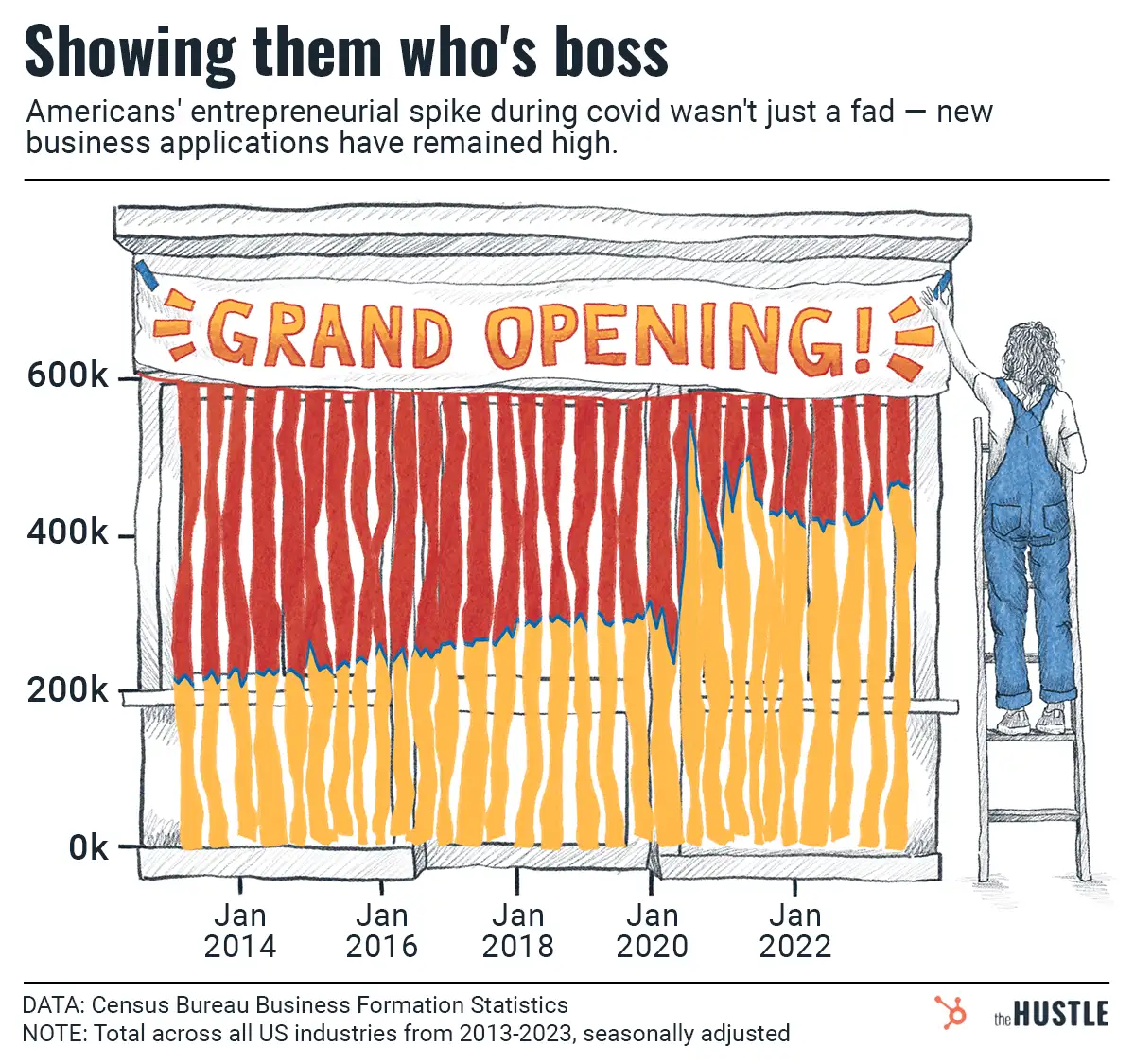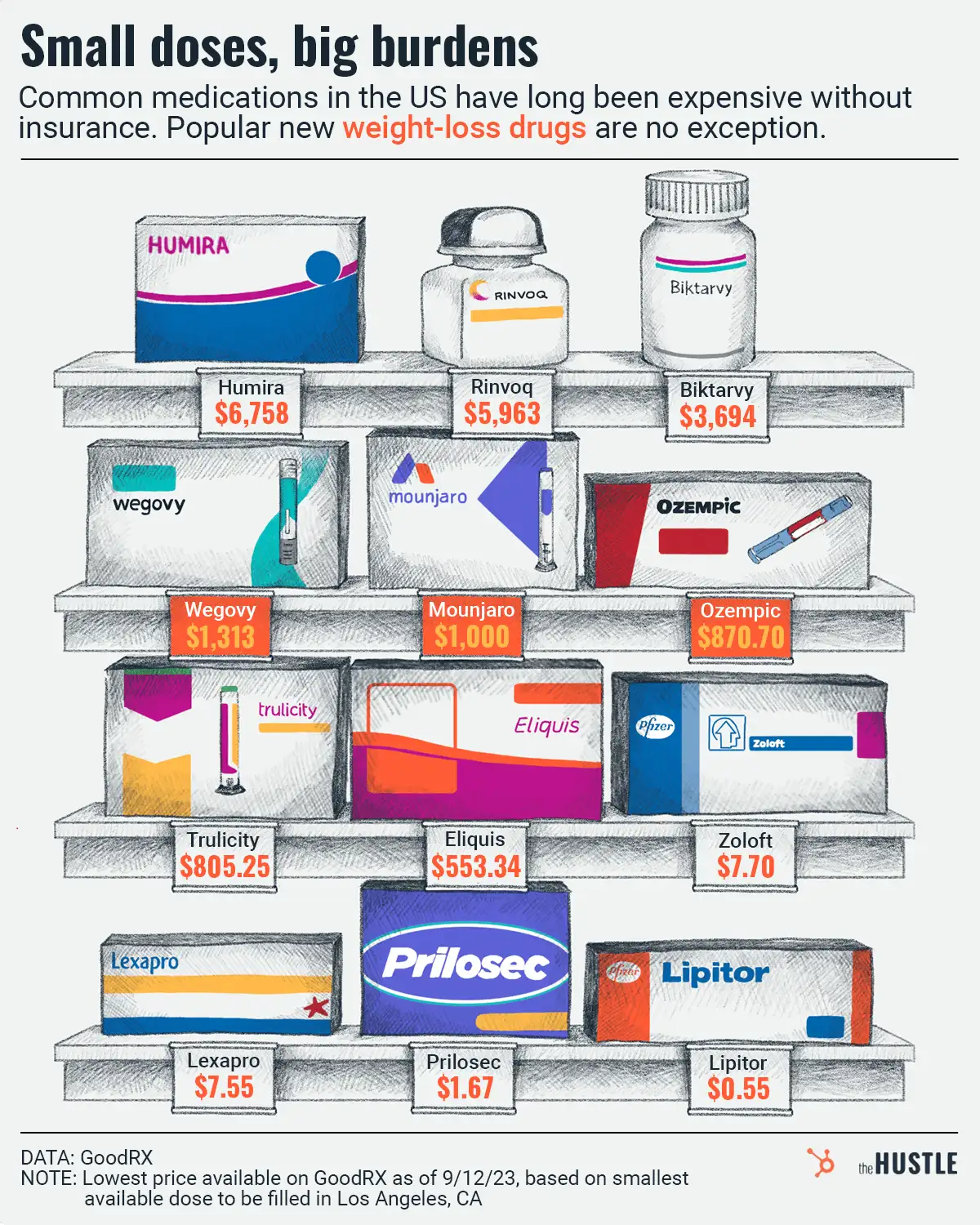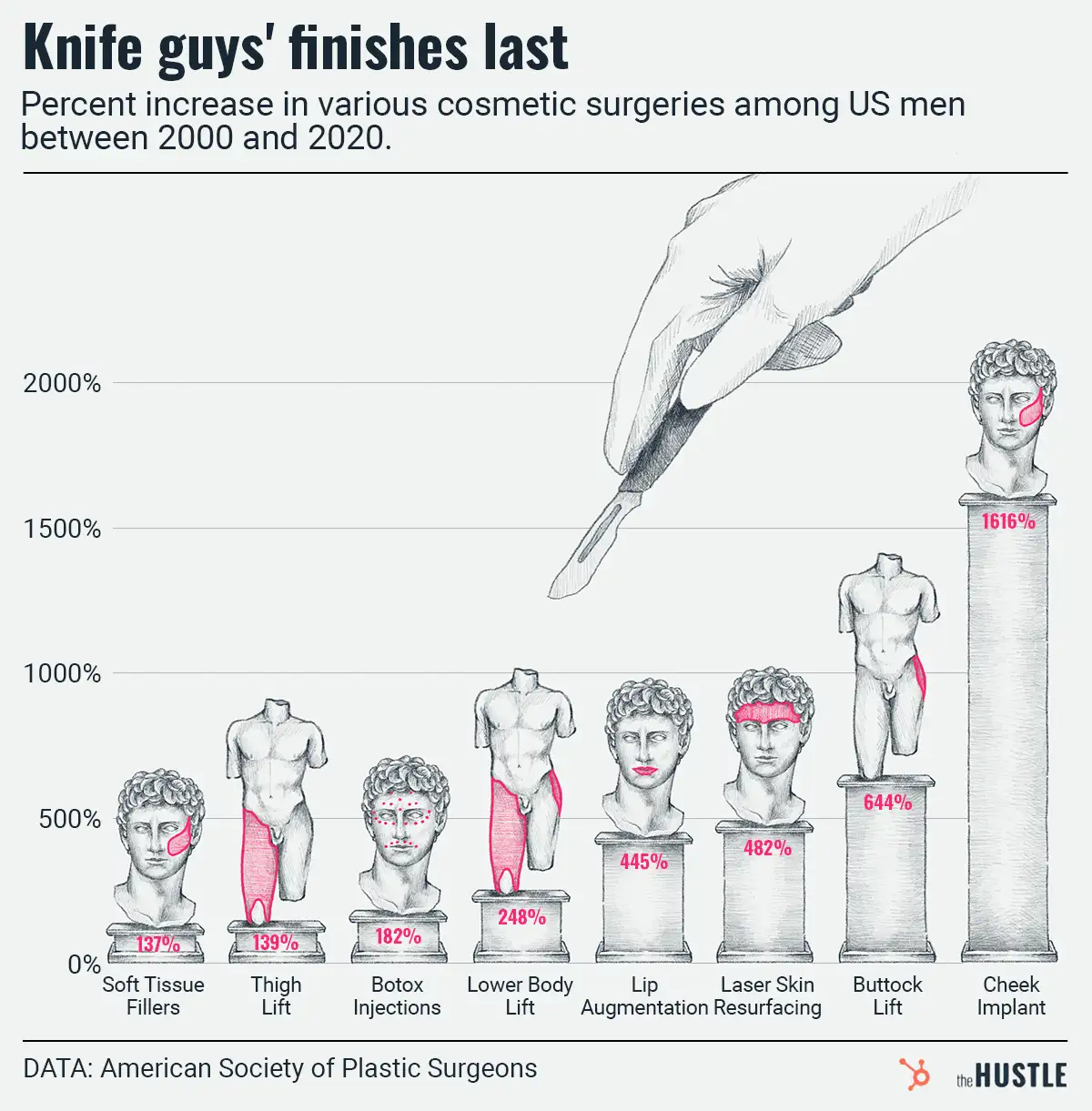Rob Litterst — a Hustle contributor who writes the pricing strategy newsletter Good, Better, Best — conducted this interview.
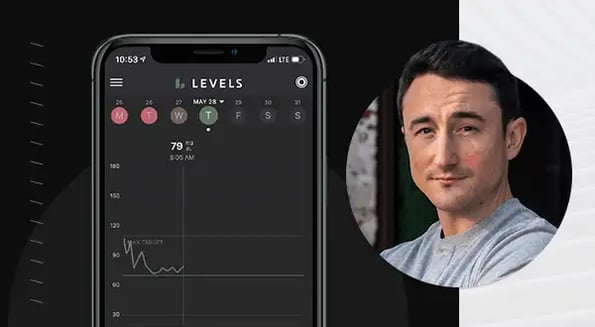
***
Diabetes is a huge problem in America, with 100m+ adults either diabetic or pre-diabetic according to the CDC.
To tackle this issue, Josh Clemente co-founded Levels.
The health startup — which recently raised $12m, led by Andreessen Horowitz — provides users with a constant glucose monitor (CGM) patch that attaches painlessly to the arm and can do real-time metabolism tracking via an app.
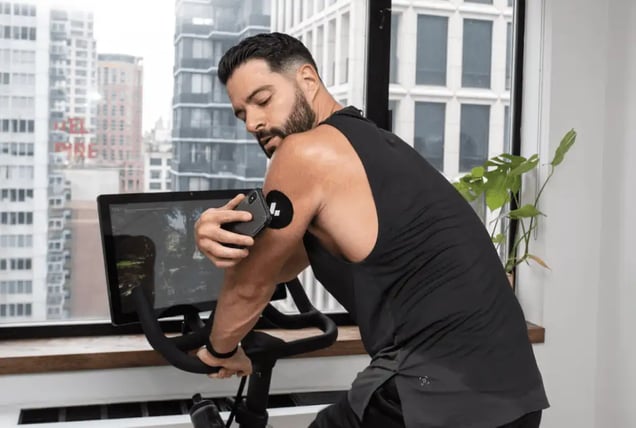
Clemente — a hardware engineer who spent 6 years at SpaceX — spoke with The Hustle about the startup’s mission:
***
Josh, let’s go back. Where did the idea for Levels come from?
It actually started from doing my own research on myself… I had always had a “calorie-in, calorie-out” philosophy with my diet where I felt as long as I was working out regularly, it wouldn’t really matter what I put in my body.
Then I started to have these episodes where my energy levels would slump to the point that I thought there was something seriously wrong. When doctors couldn’t tell me what was going on, I started doing research myself.
That led me down a rabbit hole where I eventually found the profound role that diet plays in holistic health.
What kind of research did you do on yourself?
I would go out to CVS and buy finger-prick blood sugar tests and record the results in an Excel sheet. After a few weeks of doing 60 tests a day, I realized my energy was highly correlated with glucose levels that were directly tied to my diet.
These single point measurements couldn’t really help me make better choices though, so when I discovered a continuous glucose monitor which measures blood sugar 24/7, everything changed. I was able to connect specific actions I was taking with negative reactions in my body in real time.
So where’d you go from there?
Honestly, working solo, I wasn’t sure how to get started. I knew there was an accessibility problem for this type of data, but it didn’t come together immediately.
I was thinking about designing a Continuous Glucose Monitor and bringing that to market, but it took about a year of digging deep into the research and understanding that this problem is just way larger than I ever imagined.
There are 100m+ American adults with pre-diabetes and 84% of them don’t know it. The CDC thinks 70% of those people will transition to Type 2 diabetes in the next 5-10 years if they don’t make some changes. How are they going to make changes if they’re not measuring anything?
That’s where Levels comes in…
Exactly. It became clear that the people who need this most don’t know they need it most, so the solution has to be one that’s mainstream, desirable, and effective. In order to get there, I found the hardware wasn’t the issue.
What we needed was a better software solution, a better user experience, and behavior-change engine. Being a hardware engineer, I was ill-equipped to do that, so I pitched the business plan to Sam (Corcos), my co-founder, who’s a software engineer, multi-time founder, and generally brilliant guy.
It took him about 24 hours to get on board. From there, we incorporated Levels and set out to build a rockstar team.
Given that Levels intersects both healthcare and tech, how did you go about recruiting early employees?
We really wanted exceptional co-founders in each of the business verticals. So we convinced David Flinter and Andrew Connor from Google to join and run product and engineering.
And then we brought in Casey Means, who’s a Stanford-trained surgeon and functional medicine doctor, as our chief medical officer. That covered most of the spectrum of challenges we face.
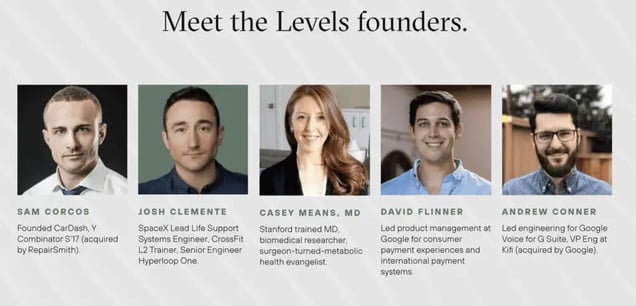
How has your experience at SpaceX and Hyperloop influenced your work at Levels?
I would say the first thing that SpaceX really drills is thinking from first principles, and what that means [is] just drilling down to the basic, underlying foundations of a problem. People don’t want to be unhealthy — nobody wants Type 2 diabetes.
The reason they end up there is because they’re flying blind, and the compounding effects of their choices are heading in a negative direction. And they don’t know that until they cross this invisible boundary where suddenly, they’re sick.
At that point, it could be decades too late. So the first principle solution is give people better information in real-time about the effect of each decision they’re making.
That makes sense.
The next thing is Closed Loops. A Closed Loop system is where each decision is influenced by the decisions prior, which leads to constant improvement. We’re trying to build a behavior-change model that is closed-loop. You sit down for lunch, measure the response, then use that information to determine which action to take next or which to take in the future.
The last one is more of an Elon Musk-ism, which is how we’re creating a new category. Tesla positioned itself as a luxury good to destigmatize electric vehicles, and we’re trying to do the same thing for blood-marker monitoring.
By building an aspirational company with premium positioning, we can reframe the entire conversation. We can step out of the post-diagnosis approach to measuring bio-markers and instead say up-front, you are empowered by this technology.
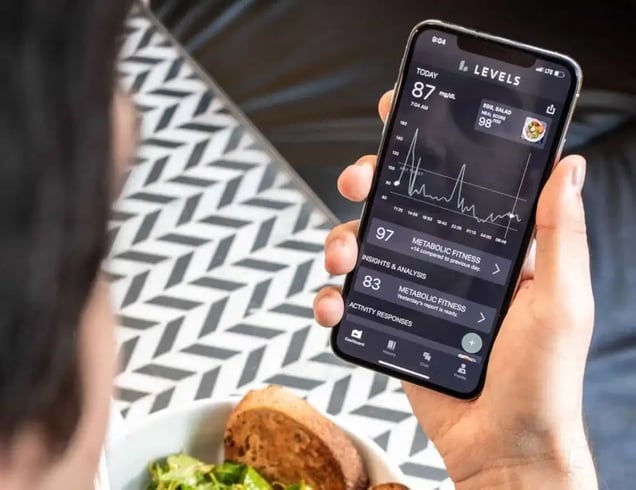
Other than improving personal metabolic health, what are some of the other downstream benefits of Levels that you’re excited about?
One of the secondary effects I’m most excited about is that food companies will have a much harder time getting away with misleading marketing when the consumer is empowered with their own data. When that happens, consumers will demand healthier alternatives, supply will improve, and pricing will come down for those healthier products.
What’s the biggest behavior change that you’ve experienced from Levels?
Levels rewrote my nutrition approach from the ground up. After one week, Levels completely kicked a lifelong addiction to sweets. College friends remind me that I used to literally eat candy for dinner.
I’d just eat peanut butter M&Ms or Sour Patch Kids until I was full. After seeing that trigger a near-Diabetic episode, I swore off it, and it’s been 3 years since I’ve had any candy besides dark chocolate.
Do you use any connected fitness tools?
I wear three devices 24/7: Levels, my Garmin 245 watch, and my WHOOP strap. I also just got an Eight Sleep pod pro, which I am so excited about.
Favorite book of the last 12 months?
This one’s easy. Extreme Ownership by Jocko Willink.
Best advice you’ve ever gotten?
This is my dad’s tagline, which I believe he got from Mark Twain, but he always said, “The most important elements for success are ignorance and confidence.”
It comes off wrong because of the ignorance piece, but when it comes to solving hard problems, I believe ignorance is actually an advantage because you’re untainted by previous biases.
Combining that with confidence, and believing there’s a possibility despite negative signals, that’s been huge for Levels. My dad’s been saying that since I was a kid and it’s so cool that it’s clicked.
Who’s the most interesting person you’ve ever met?
This one’s easy, it’s Elon. I worked closely with him a few times over my 6 years at SpaceX, and the way that he can manifest the future he wants years in advance is truly incredible. He’ll continually make choices that seem detached from reality at the time and then reap the benefits years later.
He doesn’t do any angel investing or hedging, he puts all of his net worth into the companies he spends all day on, and when the stakes are highest, that’s when he personally doubles down and goes all in.
Request for a startup?
I’ve been reading this book The Decadent Society, and one thing that’s really concerning is every corner of the world has a declining birth rate.
We’re below our replacement rate, which has me thinking: Is there a way to incentivize building a large family? It’s not really a cogent startup idea, but I think there’s something there.







